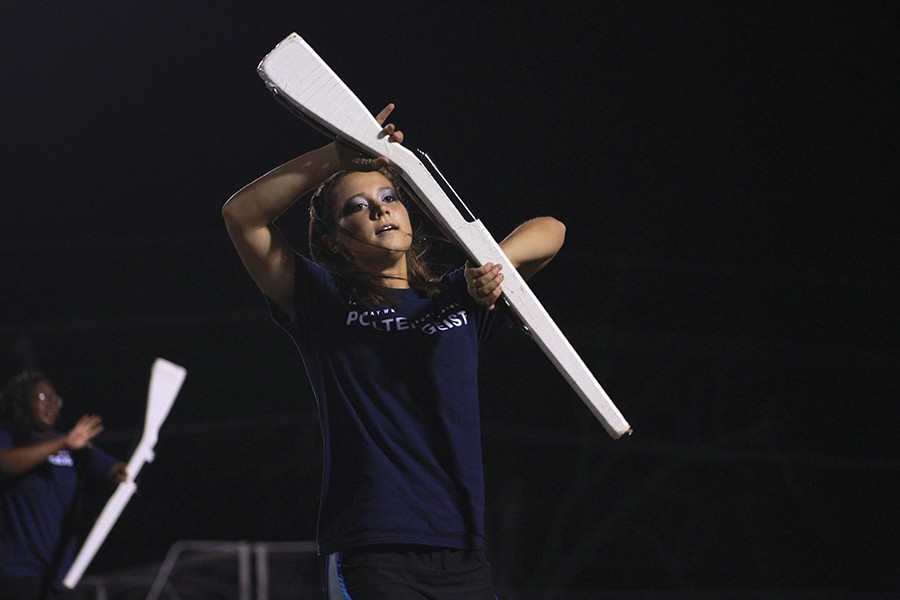Have you ever heard a group of girls screaming “Bears on three! One, two, three, BEARS!” after half time at varsity football games? Those girls make up the Parkway West Color Guard, who dedicate three to four months every season to dancing alongside the marching band.
Competition days are typically eight to 12 hours long for the marching band and color guard, and 15 hours for competitions far from St. Louis, so members have strategies to boost their energy so that they can make it through the day.
“I play my pump-up jams. I play the Ellie Goulding songs, ‘On My Mind’ and ‘Powerful,’” junior DeMonica Mims said.
The band must report to the music hallway 30 to 45 minutes before the buses are scheduled to leave. Competitions require students to be in the band hallway between 6:30-7:00 a.m. if they are performing in the morning, and 8:30-9:00 a.m. if they have an afternoon performance.
“[I think] ‘What do I need?’ as [I’m] trying to get everything in one place, make sure everything gets on the buses,” senior captain Tori West-Staples said. “I want to keep everyone happy and calm and if something’s really bothering someone, I’ll make sure that they’re okay, and I’ll try to keep my calm. It’s always good to keep everyone from freaking out.”
Color guard completes one ritual, secret sibling, as they board the buses.
‚ÄúEveryone writes their name and what they like on a piece of paper during band camp, and we put it all in a hat. We all pick a name randomly, and before every competition you give that person a gift based on what they put on their paper. ¬ÝYou aren‚Äôt allowed to tell who you have, and at the end of the year or the season you reveal who you have and give a bigger present,‚Äù West-Staples said.
The bus rides to competitions can range from 15 minutes in length to two hours.
“The brass bus is so loud, and I think they do that to calm their nerves, I guess, but I like quiet buses,” junior Kayla Johnson said.
Competitions generally draw 15 to 25 bands, most of them double or triple the size of West‚Äôs marching band. ¬Ý
“I’m very serious. There’s no messing around, especially by the adults, it’s very ‘Get your head in the game’ it’s not time to joke around, I just try to compose myself, try to get my head into the fact that I’m about to perform,” West-Staples said.
The marching band’s current show is entitled Poltergeist, and band parents created a giant TV as a prop with a set of steps leading up to it, where the color guard waits for the music to start.
“[I’m] nervous, but yet excited, because I know we’re all gonna do good, and it’s just fun being out there with your friends-your family I should say, because that’s basically what we are, one big giant family,” Mims said. “[When running through the show, I tell myself] don’t let it slip out of your hands, it’s right there, snag [the flag or rifle] and go.”
West-Staples follows a similar pattern as Mims.
‚Äú‚ÄòDon‚Äôt fall…or drop,‚Äô I say. ¬Ý[I] make sure that my counts are there, and that I‚Äôm just in it, I don‚Äôt really think much when I‚Äôm performing, because I just get so engulfed in it, there‚Äôs not really much going through my mind, I just perform,‚Äù West-Staples said.
After performances, each section gathers to shout a chant. ¬ÝColor guard‚Äôs chant got its origins two years ago.
‚ÄúLucy Vehlewald, who was a sophomore when I was a freshman began calling DeMonica Baby Bear, and then she decided to give us all bear names. ¬ÝI got Crazy Bear,‚Äù Johnson said.
After the other bands have performed in the preliminary round, every drum major forms a line on the track for the awards ceremony.
“I still get excited for it, but we’re not as good [of a band] as we were; I don’t know if it’s because we have a different band director and the band’s just not feeling it or something else,” Johnson said.
On the bus ride home, most people fit under one of two extremes: very talkative or dead silent.
‚ÄúOn the ride home, I want to go to sleep, I want to eat, I want someone to cuddle me because it‚Äôs cold from the windows. ¬ÝI think, Hey John, stop talking so much so I can sleep,‚Äù Mims said. ¬Ý
The color guard practices with the marching band, from July until the very end of October, totaling around 500 hours from the beginning to the end of the season.
“You have to have a good memory, you have to memorize a lot, or else you don’t really know what you’re doing on the field, and your coach isn’t out there, so you’re kind of on your own, if you’re not standing by someone; but you can’t watch the person right next to you, so you really are on your own,” Johnson said.




![Freshman Daphne Stokes looks at a table with Veterans Day flyers and information on Nov. 11. Stokes, along with other West High students, like senior Alexander Lewinski, passed by the table in the cafeteria with army recruitment information and giveaways for students to observe during lunch. “Talking with [the recruiters] has definitely helped me [find] where I wanted to go, more than anything else,” Lewinski said.](https://pwestpathfinder.com/wp-content/uploads/2025/11/DSC_1227-2-1200x800.jpg)
![Helping a customer, print room assistant Gretchen Williams operates her booth at the West High Craft Fair from Oct. 25-26. This was Williams’ first time participating in the Craft Fair with her new craft shop, Gs Beaded Boutique. “People have always said, over the years, ‘you should open something.’ [I replied that] I would rather just make [my crafts as] gifts for people. I just started [the online store] up, and it's been okay. I'm always surprised [by] how many views I get and [the] people from different states buying things; somebody from Alaska bought something the other day.”](https://pwestpathfinder.com/wp-content/uploads/2025/11/DSC0451-2-1200x799.jpg)
![Gesturing toward the club’s name on the board, Global Youth Aid co-president year Daniah Alsagheer discusses upcoming service projects with members during a meeting on Oct. 30. “We might be one club at one school, but together, we’re [part of] something much bigger,” Alsagheer said.](https://pwestpathfinder.com/wp-content/uploads/2025/11/DSC00949-1200x800.jpg)
![Focused on providing exceptional service, sophomore Darsh Mahapatra carefully cleans the door of a customer’s car. Mahapatra has always believed his customers deserve nothing less than the best. “[If] they’re trusting us with their car and our service, then I am convinced that they deserve our 100 percent effort and beyond,” Mahapatra said.](https://pwestpathfinder.com/wp-content/uploads/2025/10/DSC_0018-1200x800.jpg)
![Sophomore Aleix Pi de Cabanyes Navarro (left) finishes up a soccer game while junior Ava Muench (right) warms up for cross country practice. The two came to Parkway West High School as exchange students for the 2025-2026 school year. “The goal for the [exchange] program is to provide opportunities for both Parkway students and our international exchange students to learn about other cultures, build connections and become confident, capable, curious and caring — Parkway’s Four C’s — in the process,” Exchange Program Lead Lauren Farrelly said.](https://pwestpathfinder.com/wp-content/uploads/2025/10/Feature-Photo-1200x800.png)

![Gazing across the stage, sophomore Alexis Monteleone performs in the school theater. The Monteleone family’s band “Monte and the Machine” has been releasing music since 2012, but Alexis started her own solo career in 2024 with the release of her first single, Crying Skies. “My whole family is very musical, [and I especially] love writing [songs with them],” Monteleone said.](https://pwestpathfinder.com/wp-content/uploads/2025/09/DSC7463-1200x798.jpg)
![Amid teaching a lesson to her AP Calculus BC class, Kristin Judd jokes alongside her students in their funny remarks. Judd has always enjoyed keeping the mood light in her classroom, along with on the volleyball court. “[I enjoy] that side talk where you see [or] overhear a conversation and chime in, or somebody says something funny,” Judd said.](https://pwestpathfinder.com/wp-content/uploads/2025/09/image-1200x730.jpg)
![Eyeing the ball, junior Ella McNeal poses for her commitment pictures at Clemson University. McNeal’s commitment comes after months of contact with top Division 1 soccer programs. “ It has taken a lot to get to where I am, but I know that [what] I've already been through is just the beginning, and I can't wait for what is to come,” McNeal said.](https://pwestpathfinder.com/wp-content/uploads/2025/09/IMG_4926-1200x900.jpeg)
